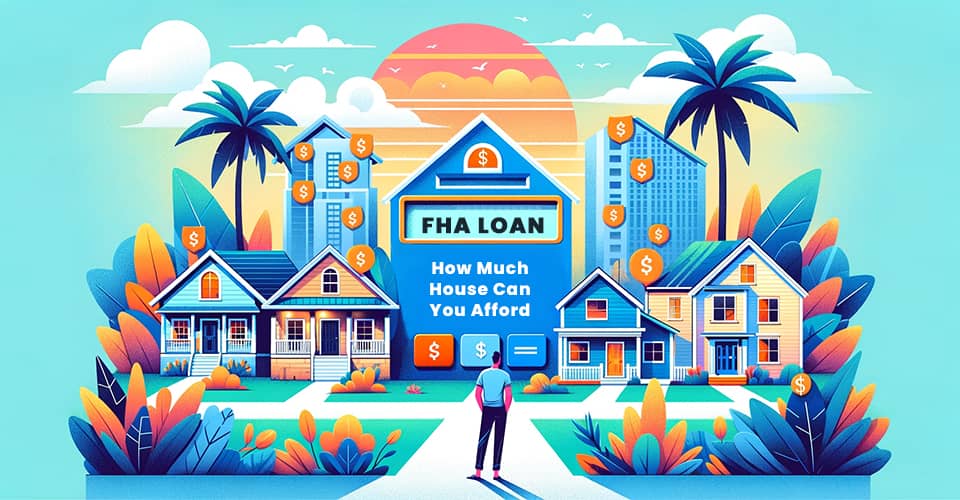How Much House Can You Afford In Florida With An FHA Loan?
FHA loans are an attractive option for many first-time buyers in Florida due to their more lenient credit criteria and reduced down payment demands.
To navigate this process in Florida, you must clearly understand what you can realistically afford and familiarize yourself with the specific requirements to qualify for an FHA loan.
Let's delve into how you can determine your affordability and the eligibility criteria needed for an FHA loan in Florida.
What Impacts How Much You Can Afford with An FHA Loan?
Here’s a summary of the key factors influencing your ability to afford and qualify for an FHA loan in Florida:
-
Location in Florida: Your location affects affordability due to varying home prices, property taxes, and living costs across different areas.
-
Down Payment Size: A minimum of 3.5% down payment is required, but don’t forget to include closing costs and the mortgage insurance premium in your budget.
-
Debt-to-Income Ratio: Keeping your DTI below 45% is essential, as it affects both your loan qualification and the amount you can borrow.
-
Credit Score: Your credit score not only determines your down payment but also influences the interest rate on your mortgage.
-
Choice of Lender: Different lenders offer varying rates and terms. Local expertise, like that from MakeFloridaYourHome, is invaluable in finding the right lender for you in Florida.
- FHA Loan Qualification: You must meet FHA's loan limits, use the property as your primary residence, pass a property inspection, and have a steady employment history.
Understanding the various elements that influence your borrowing capacity with an FHA loan is vital for any prospective homebuyer in Florida.
These factors determine your readiness to purchase a home and play a significant role in shaping the terms of your mortgage, including the interest rates you'll be eligible for. Comprehending these components is indispensable for making a well-informed decision and securing the best financial terms.
In the context of Florida's housing market, it's important to consider how these factors specifically apply to FHA loans in the state. Let's explore what aspects affect how much you can borrow and how they impact your ability to secure favorable loan conditions in Florida.

What Part of Florida You Are In
The role of your geographical location in Florida is a crucial element in determining your purchasing power with an FHA loan. This is due to the variation in home prices, property taxes, and the general cost of living across different regions in the state.
Understanding how location influences your affordability is key:
-
Home Prices: Florida's real estate market is diverse, with home prices varying significantly from one area to another. This variation affects the down payment you need to comply with FHA guidelines. You might need to prepare for a larger down payment in areas with higher property values.
-
Property Taxes: Florida's local property tax rates can greatly affect your monthly mortgage payments, especially if you have an escrow account. Different counties and cities within Florida have varying tax rates, impacting your affordability.
-
Cost of Living: In areas of Florida with a higher cost of living, your disposable income may be lower, affecting how much you can comfortably allocate towards a mortgage payment.
-
Local Market Dynamics: The supply and demand in Florida's housing market can fluctuate, influencing home prices. Understanding these market conditions can help you gauge what you can afford in different parts of the state.
- FHA Loan Limits: The FHA sets loan limits that vary by county, reflecting Florida's local median home prices. In counties with higher median prices, the FHA loan limits are correspondingly higher, potentially allowing you to borrow more.
Each factor plays a significant part in shaping your ability to afford a home with an FHA loan in Florida, making it essential to consider them in your home-buying decision process.
The Size of Your Down Payment
The amount of your down payment is a pivotal factor in determining what you can afford with an FHA loan. To be eligible for an FHA loan in Florida, you need to contribute a minimum of 3.5% of the home's purchase price as a down payment. For instance, for a $200,000 home, you would require a minimum down payment of $7,000 (3.5% of $200,000).
However, it's important to remember that additional expenses are involved in the home-buying process, often called closing costs. These include expenses such as loan origination fees, appraisal fees, and title insurance.
A significant cost associated with FHA loans is the mortgage insurance premium (MIP). The FHA requires two MIP payments: an upfront MIP, which is 1.75% of the purchase price and is due at closing, and an annual MIP, divided into monthly payments.
This annual MIP varies based on several factors, including the total loan amount, the size of your down payment, and the term of your loan.
In Florida, the closing costs for FHA loans typically fall between 3% and 6% of the home's purchase price. Therefore, it's essential to factor in these costs when calculating your total down payment and the overall affordability of your home purchase with an FHA loan.
Your Debt-to-Income Ratio
Your debt-to-income ratio (DTI) is a key metric in determining your eligibility and financial capability for an FHA loan in Florida.
To calculate your DTI, divide your total monthly debt payments by your gross monthly income. This ratio is crucial as it influences your qualification for the loan, your borrowing limit, and the monthly payments you can comfortably handle.
A lower DTI often means you can qualify for a larger loan and manage your mortgage payments more easily. The FHA generally prefers a DTI ratio below 45%.
For instance, if you're in Florida and your combined monthly debts, including your prospective mortgage, total $2,500, and your gross monthly income is $6,000, your DTI would be approximately 41.67% ($2,500 divided by $6,000).
This falls within the acceptable range for FHA loans. Florida homebuyers must keep their DTI within this range to maximize their chances of loan approval and secure a loan amount that aligns with their financial situation.
Your Credit Score
Your credit score plays a critical role in determining the terms of your FHA loan in Florida, influencing your down payment and the monthly mortgage payments.
The FHA sets specific guidelines based on FICO® credit scores:
-
FICO® Score of at least 580: With a credit score of 580 or higher, you are eligible for the FHA's minimum down payment requirement of 3.5% of the home's purchase price. For a $200,000 home, a down payment of $7,000 is required.
- FICO® Score between 500 and 579: If your credit score is in this range, the FHA mandates a higher % down payment of 10%. A home priced at $200,000 translates to a down payment of $20,000.
It's important to note that individual lenders in Florida may have their own minimum credit score requirements. For instance, a lender like Rocket Mortgage® typically requires a minimum credit score of 580.
Moreover, your credit score can impact the interest rate on your FHA loan. A lower credit score generally leads to a higher interest rate, which can increase the total amount of your loan and result in higher monthly payments.
Therefore, it’s essential to consider how your credit score will affect the overall cost of your FHA loan in Florida.
The Florida Lender You Choose
Choosing the right lender is a crucial aspect of securing a mortgage in Florida, and local expertise, like that provided by MakeFloridaYourHome, can be invaluable in this process.
Lenders have a degree of flexibility in setting their interest rates, which are influenced by the federal funds rate but also depend on various other factors.
These include current market conditions in Florida, specific loan terms, a borrower's credit score, and how they stack up against their competitors' pricing.
It's important to shop around and compare different lenders in Florida. This helps you understand their unique pricing structures and prepares you for potential rate increases, which directly impact home affordability.
Higher interest rates mean higher monthly mortgage payments, a decrease in your buying power, and an overall more expensive loan over its lifetime.
Given these considerations, it's essential to compare the rates and terms various lenders offer carefully. This approach allows you to make a well-informed decision, secure a favorable initial rate, and avoid any hidden costs that might arise from rate fluctuations.
MakeFloridaYourHome's local expertise can guide you through this process, ensuring you find a mortgage option that best suits your financial situation and goals in the Florida housing market.
Qualifying for an FHA Loan in Florida
To qualify for an FHA loan, understanding and meeting the specific requirements set by the Federal Housing Administration is crucial.
Here's a breakdown of these key eligibility criteria:
-
FHA Loan Limits: The maximum loan amount varies based on the county and property values.
-
Primary Residence Requirement: The property you purchase with an FHA loan must be your primary residence, not an investment property or a second home.
-
Inspection: The property must undergo an inspection to ensure it meets the FHA's minimum standards.
-
Credit Score: A minimum credit score of 580 is required for a 3.5% down payment. For credit scores between 500 and 579, a 10% down payment is necessary.
-
Occupancy: You need to occupy the property within 60 days of closing.
-
Steady Employment History: Demonstrating a steady employment history and providing verifiable income documentation is essential.
-
Appraisal: An FHA-approved appraiser must appraise the home.
- Debt-to-Income Ratio (DTI): Your DTI should be below 45%, and your monthly mortgage payment should not exceed 38% of your monthly gross income in certain circumstances.
Meeting these reordered criteria is essential for qualifying for an FHA loan, and each plays a crucial role in the eligibility and terms of the loan.
The Bottom Line
FHA loans present a compelling choice for many first-time buyers in Florida, thanks to their more forgiving credit requirements and lower initial down payment needs.
Understanding what you can realistically afford and the specific criteria for FHA loan eligibility in Florida is critical for a successful home-buying journey.
When considering an FHA loan in Florida, it’s not just about finding a house; it’s about balancing your aspirations with financial reality.
With local insights and a thorough understanding of these factors, you can navigate the complexities of the FHA loan process in Florida and make informed decisions that align with your home-ownership goals.
With over 50 years of mortgage industry experience, we are here to help you achieve the American dream of owning a home. We strive to provide the best education before, during, and after you buy a home. Our advice is based on experience with Phil Ganz and Team closing over One billion dollars and helping countless families.

About Author - Phil Ganz
Phil Ganz has over 20+ years of experience in the residential financing space. With over a billion dollars of funded loans, Phil helps homebuyers configure the perfect mortgage plan. Whether it's your first home, a complex multiple-property purchase, or anything in between, Phil has the experience to help you achieve your goals.


 By
By  Edited by
Edited by 






